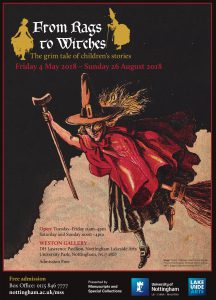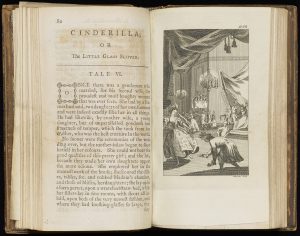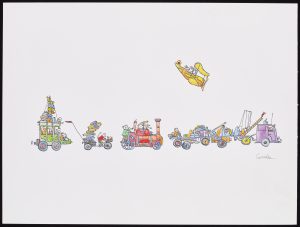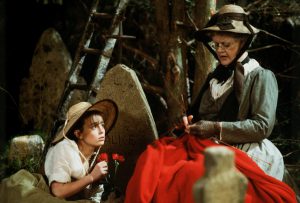April 20, 2018, by Kathryn Steenson
From Rags to Witches: the grim tale of children’s stories
Once upon a time, fairy tales were not for children – and some were even banned by the church as a threat to faith or morality.
Using original archives and rare books from the University of Nottingham’s Manuscripts & Special Collections, From Rags to Witches: the Grim Tale of Children’s Stories will explore a range of children’s stories and traditional tales, from the beloved to the forgotten tales that never got a happily ever after.

From bloodthirsty stories set in sinister European forests, to the benign bedtime tales set in comfortable Victorian nurseries, this new exhibition at the Weston Gallery, Nottingham Lakeside Arts, traces the development of children’s literature through the generations.
Told and retold by countless storytellers, the versions we are familiar with today can be very different from the ones that entertained our ancestors by the fireside. These were stories of sex, death and curses, and were so morally outrageous that in 1604 the Catholic Church placed one Italian fairy tale collection on its Index of Forbidden Books. The 16th century copy on display was published just before the ban was enforced, and contains some of the earliest surviving written versions of fairy tales.
Fairy stories began to be seen as a threat to children as new theories about childhood and education developed. A new genre of moral children’s books was born, intended to promote rational thought and Christian morality. Instead of princesses in enchanted castles in faraway places and long ago times, stories were set in the modern world where naughty children met wretched fates and pious children gave heartfelt deathbed speeches warning of the perils of Hell.

But good fairy stories triumphed. On display is an 18th century book by Charles Perrault containing his beloved tale Little Red Riding Hood and the first English-language publication of Hans Christian Andersen’s stories from 1846, including The Constant Tin Soldier, a doomed love story of a one-legged tin soldier and a paper ballerina. They were translated by Nottingham’s Mary Howitt, who was so captivated by his stories that she learnt Danish specifically to translate them. A successful children’s author of the time, her best-known poem, The Spider and the Fly, will also be on display.
Children’s books became beautiful in the 19th century with illustrators such as Kate Greenaway becoming household names. Her original pencil sketches are on display, presented to the University of Nottingham after her death in remembrance of the part of her childhood spent in Rolleston, Nottinghamshire. The East Midlands continues this artistic tradition with illustrators such as Carol Adlam, who will be opening the exhibition at its launch on 3rd May. She teaches book illustration and has been Artist-in-Residence at The National Archives, Nottingham Museums, and Nottingham Lakeside Arts.
A series of talks and events will be held to accompany the exhibition, all at Lakeside Arts, University Park, NG7 2RD. Places are limited so please book your tickets online or by calling the Box Office on 0115 8467777.
Workshops
Storyboarding Picture Books
Wednesday 9 May, 9am – 1pm
£20 (£10 concessions)
For ages 16+
Author-illustrator Carol Adlam will take you through the building blocks of creating a picture book for children, focusing on storyboarding and producing thumbnail layouts for your work. Please come to the workshop with an idea for a picture book, written down in no more than 100 words.
From Pirates to Porcupines: Creating Magical Children’s Book Characters
Saturday 4 August, 10am – 1pm
£6 (accompanying adult free)
For ages 5-9
Join us for a celebration of the magical characters that inhabit children’s illustrated books in a fun workshop aimed at children and families. We want you to create something funny and perhaps even a little bit scary. Working with two published author/illustrators, Sarah McConnell and Maelle Daub, you will create your own illustrated sequence in a fun imaginative session for everyone.
Lunchtime talks
All talks are 1 – 2 pm in the Djanogly Theatre, Nottingham Lakeside Arts and are free to attend.
The Uses of Fairy Tales: Enchanting Ideologies and Radical Transformations
Thursday 10 May
Rachel Palfreyman, Associate Professor in German Studies at the University of Nottingham, discusses how fairy tales have been interpreted, ranging from their exploitation for political purposes to Bettelheim’s orthodox and much-criticised Freudian approach – and how readers brush ideology aside to return to the stories again and again.
Invisible Storytellers: Cinderella, Pinochio and the remarkable role of translators in the history of British children’s literature
Thursday 5 July
When we see a child enjoy the stories of Cinderella and Pinochio, or engrossed in an Asterix album, it is easy to forget the role of a translator in producing English versions of these tales. Gillian Lathey, Senior Honorary Research Fellow at the University of Roehampton London, will introduce some of these invisible storytellers and pay homage to their neglected craft.
Child Readers and Their Books in Nineteenth-Century Britain
Thursday 26 July
Colin Heywood, Emeritus Professor of Modern French History at the University of Nottingham, focuses on the society and culture in which children were raised in the 19th century. This talk will cover the massive increase in the quantity and quality of literature written specifically for children in 19th century Britain, which included a shift in content, from heavily didactic works to those concerned above all with giving pleasure to their readers. It will also analyse the underlying forces at work, notably the growing interest in childhood and education, and the achievement of near-universal literacy.
Film Screening
Djanogly Theatre
The Company of Wolves (Cert 18)
Wednesday 13 June, 7.30pm (running time 1 hour and 35 minutes)
£5 (£3 concessions)
A horror-fantasy film based on the werewolf story of the same name in Angela Carter’s 1979 short story collection The Bloody Chamber. In her sleep, teenager Rosaleen (Sarah Patterson) disobeys the lession her grandmother (Angela Lansbury) teaches her to never trust strangers, and in doing so rewrites the ending of ‘Little Red Riding Hood’.
With an introduction by local performance poet Andrew Graves.
No comments yet, fill out a comment to be the first



Leave a Reply